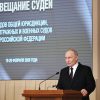Scientists have had eyes on Sars-CoV-2, the virus that causes Covid-19, since the beginning of this pandemic.
They can see it is evolving, but it is happening at a glacial pace compared with two other viruses with pandemic potential: those that cause flu and Aids. That is good news for efforts to develop vaccines and treatments, but scientists remain wary that anything could still happen.
“This virus is evolving and that’s what we expect it to do,” says Thushan de Silva, an infectious diseases doctor at the University of Sheffield and member of the Covid-19 Genomics UK Consortium (COG-UK), which has contributed more than 50,000, or roughly half, of the viral genome sequences that have been collected globally to date.
Tracking the virus: the ‘G’ mutation
All Sars-CoV-2 sequences are being deposited in GISAID (Global Initiative on Sharing All Influenza Data). Each sequence comes from an infected individual, and by pooling and comparing them, scientists can track mutations in the viral genetic code and, in a sense, the life history of Sars-CoV-2.
Coronavirus live news: Iran in grip of ‘third wave’ of Covid pandemic; global cases pass 30m
Read more
Mutations arise through viral replication, because in reproducing itself the virus must copy its genetic code, and it rarely does so perfectly. Coronaviruses are less error-prone than flu viruses, because they have a better inbuilt proofreading mechanism. Nevertheless, ever since Sars-CoV-2 emerged as a human pathogen, somewhere in the vicinity of Wuhan, China, thousands of such mutations have been observed.
The vast majority of mutations have no effect on the virus. A mutation can vanish as soon as it appears or it can seed a new lineage. Most lineages also die out in time – lockdown helped with that – but not all.
Scientists are wary of mutations that spread rapidly, especially if they do so in separate locations, because they might belong to that rare minority that change the way the virus behaves – perhaps by making it more transmissible between people or better able to evade the host’s immune system. That change could push the variant to dominate the viral population through natural selection, if it renders the virus fitter or better able to survive and reproduce, and it could be bad news for humans.
Back in the spring, at the Los Alamos National Laboratory in New Mexico, the computational biologist Bette Korber and her team were busy building the mathematical tools that would flag up such repeat offenders in the GISAID data.
“We didn’t expect to see anything so quickly,” she says. But already they had a candidate: “The D614G mutation stood out as such a case by early April.”























































Свежие комментарии